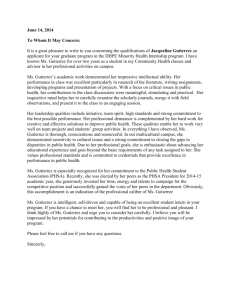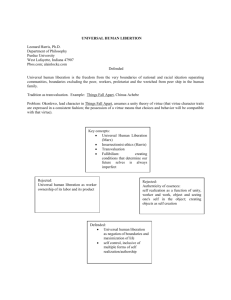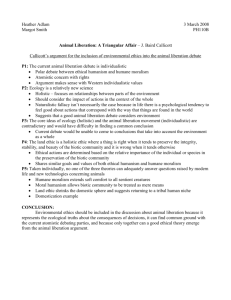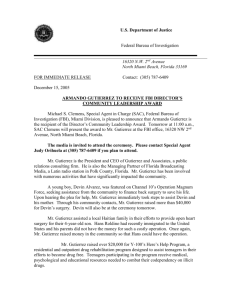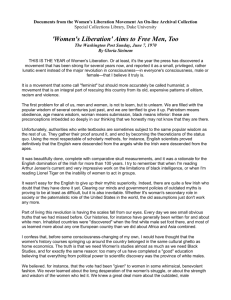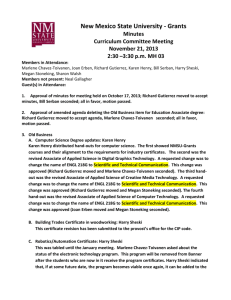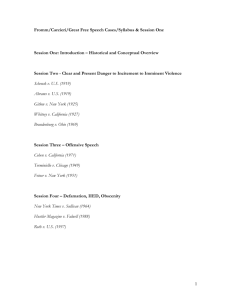liberation theology - Centro de Estudios Públicos
advertisement
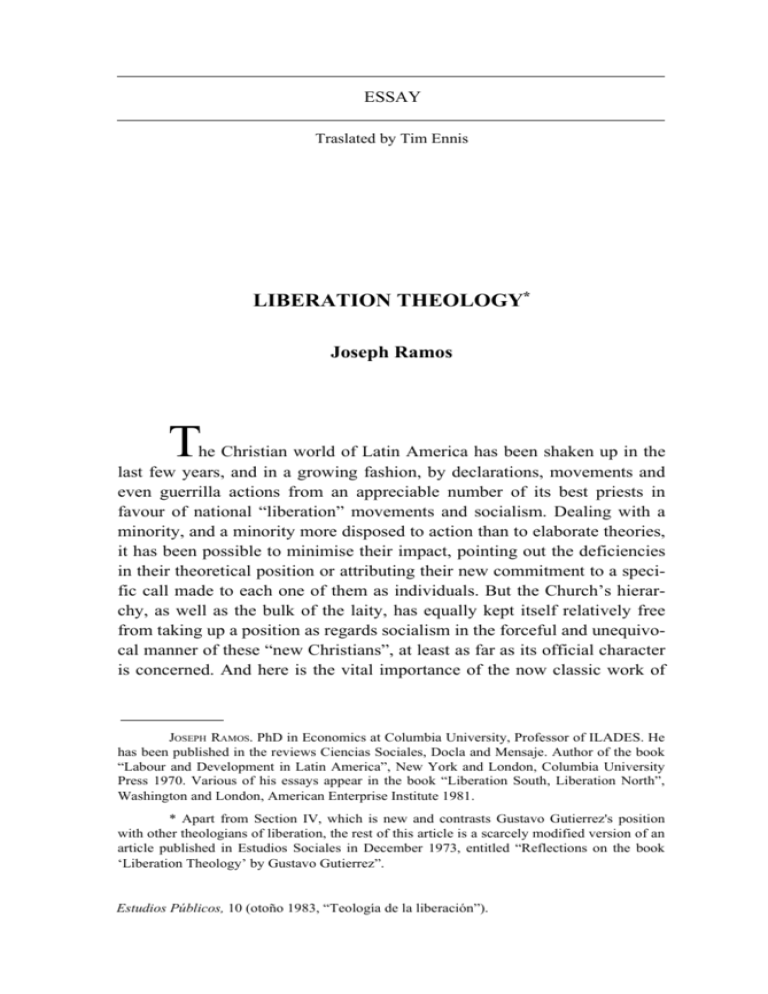
ESSAY Traslated by Tim Ennis LIBERATION THEOLOGY* Joseph Ramos T he Christian world of Latin America has been shaken up in the last few years, and in a growing fashion, by declarations, movements and even guerrilla actions from an appreciable number of its best priests in favour of national “liberation” movements and socialism. Dealing with a minority, and a minority more disposed to action than to elaborate theories, it has been possible to minimise their impact, pointing out the deficiencies in their theoretical position or attributing their new commitment to a specific call made to each one of them as individuals. But the Church’s hierarchy, as well as the bulk of the laity, has equally kept itself relatively free from taking up a position as regards socialism in the forceful and unequivocal manner of these “new Christians”, at least as far as its official character is concerned. And here is the vital importance of the now classic work of JOSEPH RAMOS. PhD in Economics at Columbia University, Professor of ILADES. He has been published in the reviews Ciencias Sociales, Docla and Mensaje. Author of the book “Labour and Development in Latin America”, New York and London, Columbia University Press 1970. Various of his essays appear in the book “Liberation South, Liberation North”, Washington and London, American Enterprise Institute 1981. * Apart from Section IV, which is new and contrasts Gustavo Gutierrez's position with other theologians of liberation, the rest of this article is a scarcely modified version of an article published in Estudios Sociales in December 1973, entitled “Reflections on the book ‘Liberation Theology’ by Gustavo Gutierrez”. Estudios Públicos, 10 (otoño 1983, “Teología de la liberación”). 2 ESTUDIOS PÚBLICOS Father Gustavo Gutierrez*, about which I am going to comment here. This deals with a theological argument, not only to justify isolated cases of individuals who are fighting for socialism as a way of carrying out their Christianity, but so that both the hierarchy of the Church and the laity take a position, here and now, against present underdevelopment and in favour of socialism, at the risk of being called unfaithful to the Christian calling. How does Father Gutierrez come to this conclusion? He starts with the primary experience for many Christians on our continent: the little that organised Christianity has to say about the principal problem of our timethe underdevelopment and injustice reigning in Latin America. It is impossible for him, as for many others-including myself-to live their Christianity (the fundamental reason for life itself) without it being related to the principal task of our times: achieving development. 1. “Liberation Theology” and Theology Gutierrez considers that Catholicism has suffered a series of internal checks which inhibit efficient action in favour of the oppressed. Among these, the one that stands out is the disproportionate emphasis in theology of individual sin over social sin. Certainly this last is also the work of individuals, but of individuals acting through social structures. According to him, the exaggerated emphasis on individual action is due to our concept of salvation, since it is the individual and not the group that is saved or condemned at the last count. Nevertheless, to overcome these barriers which inhibit the taking of a effectual position in favour of the oppressed, it is indispensable, according to Gutierrez, to reconsider the question- what is the relationship between liberation (or civilising task) and salvation? We can understand the reach of this work better and what is at the centre of the controversy, if we try to examine firstly not the actual problem of development, but the problem of human servitude. Can a person who is a slave, a person deprived of his liberty, be saved or condemned? The general opinion of theologians is in the affirmative, since every person will be judged according to their possibilities for action, whether these be large or small. However much he is restricted in his liberty, the slave still possesses a sphere of action which is his alone, as nobody can restrict his internal liberty. Furthermore, not only does slavery not make salvation impossible, but it also does not make it difficult. At the last, we will be * Perspectives on Liberation Theology, Editorial Universitaria, CEP, Lima Peru 1971 JOSEPH RAMOS 3 judged not by the amount of the means of action available to us, but by the manner we utilise them. From this, all the current theologians conclude that not even slavery, which is the maximum expression of oppression and human underdevelopment, can prevent our possibility of salvation. This being the case, it follows that no other expression of human oppression can prevent it either. nevertheless it is not difficult to understand why a strong current of theological opinion, eschatological or ascetic, maybe I would assert, the strongest in our times, tends to depreciate temporal progress, the task of civilising peoples and the development of human capabilities by recognising that, in the last resort, these considerations have absolutely no affect whatsoever, for the better or for the worse, over man’s salvation. However much the individual or the community or certain more than adequate social structures contribute to the development of people, at the end of the day man’s liberation contributes nothing to his personal salvation. Salvation is necessarily and exclusively the voluntary and personal task of each individual human being in front of God. There is another current of theological thought (the theology of the Incarnation or humanist theology) that also recognises that the state of slavery does not influence the salvation of the slave, but also emphasises the injustice that such a situation invokes: i.e. that the development of some is achieved at the expense of the effort and will of others. In the same way that robbery does not stop being an unjust action for the simple fact that it only deprives man of his earthly goods without affecting his salvation, the imposition of slavery does not stop being unjust because it does not affect the salvation of the man who is deprived of his “earthly” liberty. It is from this point that emancipation, even when does not affect the salvation of slaves in the slightest, must be considered a just action, as it restores to them what is theirs. The abolition of slavery encourages human development (a good) although, in itself, it does not foster salvation (the maximum good). Note well, however, that to promote human development is the maximum good that one can do for others since, in the last resort, we cannot help the others to save themselves, as this depends on their free decision. On the other hand we can help to make human development easier independent of people’s willingness to help themselves. This argument is a demonstration of one of the most fundamental and apparently daring theses of Gutierrez: that man’s salvation comes to pass through earthly liberty. Let us clarify this. It does not mean that the salvation of another (for example, the slave) requires his freedom beforehand. Rather it means that our own salvation requires us to fight for the 4 ESTUDIOS PÚBLICOS earthly liberty of others (of the slave, in this case). Although the liberation of the other person will always be insufficient for his own salvation, our action in his favour can be the way to our salvation, as it’s the most effective way of showing love for our neighbour. Although our love for our neighbour helps him towards his salvation, the most that we can guarantee him is a certain level of human development, if it is not accompanied by his full participation in the event. The most that we ourselves can give is our life for another’s (to sacrifice our own human development for that of another), but neither our love, nor even the love of Christ, can assure the other of salvation. It is obvious that the importance of the task of helping others and the social action thus involved, the idea of fighting for development or rather social liberation, is to fight for the Kingdom of God. However this does not imply that the fight for the Kingdom of God is reduced to a fight for earthly progress. Although each step that is taken towards liberating man from social injustice is an act of salvation (for the person who takes that step) and an act of liberation (for the person who receives it), the rise of the Kingdom of God does not finish with this act of liberation. According to Gutierrez “ not only is there no reduction in the rise of the Kingdom of God even if there is earthly progress, but, thanks to the embracing word of faith, sin, which is the fundamental obstacle to entering the Kingdom, is revealed to us as the root of all misery and injustice: and the meaning of the rise of the Kingdom is shown to us as the last state of a just society and of a new man”. (Gutierrez, page 227). Gutierrez’s stance, then, is not one of an easy Rousseau-type utopia. His thought is rooted in the most ancient of Christian traditions. Sin is not merely a product or reflection of unjust social structures, but a consequence of this intrinsic ambivalence to decide which characterises each man in his most intimate being. This ambivalence in man makes every structure susceptible to corruption, even when those structures are themselves unjust. No structure can guarantee human liberty, even on earth, while it has not overcome sin, which is the only definite liberation. That is to say that human history will always be an open process, not a pre-determined one, since sin and personal liberty form part of the infrastructure. And to overcome sin is a personal action of the subject, completely apart from his structural conditioning. Does it not strike you as strange that God asks us to help our neighbour in a task which is, strictly speaking, a secondary one (his earthly development) and prevents us, through the nature of human liberty itself, from lending our help to achieve something which is really vital- his salva- JOSEPH RAMOS 5 tion? The theologians of the Incarnation insist that the existence of human potentialities is a call for their fulfilment. They remind us of the parable of the talents: we are not only called to God, but called to love Him with all our being, through all the individual and social means within reach of the Creation. If it is correct that human development (the task of civilising mankind) does not guarantee salvation, it does increase our capacity to love (or reject) God. The task is one through which God can be fully glorified for all that He has created. This can not only be the way to our own salvation but also increase the capacity of others for glorifying God (even though we cannot guarantee that they will do that). Therefore loving your neighbour, even if it doesn’t decide his salvation, decides ours, at the same time that it promotes human development (the task of civilising mankind). The most effective way of overcoming human underdevelopmentnot only in our own time, although more especially so- could well consist of changing the structures that are obstacles to such a development and not just in improving the interpersonal contacts within these structures. For example to love your neighbour, both actually and effectively, does not consist of improving relations between masters and slaves, but in abolishing slavery as an institution (obviously being conscious of the fact that this is not the only, nor the last, unjust structure to be overcome). Love for your neighbour, therefore, is measured not only in terms of how we treat others but also in our efforts to change unjust structures. The result of this theological reflection of Gutierrez means that this task for helping mankind, which in Latin America today is primarily the fight against the underdevelopment and the poverty of the majority, becomes the principal way of fulfilling the Christian vocation. It was not like this before, in this present form at least, since centuries ago the means of overcoming underdevelopment did not exist. The great urgency for conquering this problem in our era is not due to the fact that the great majority live badly- this has always been the case- but that for the first time in history it is not necessary that this should be the case. It really is possible that the majority can live decently today, since thanks to technology, nature is not now the limiting factor that it was before. The obstacles to development today are human ones: they are defects in social organisation and not in nature. I consider Gutierrez’ theological posture to be a convincing one and this is the first conclusion that I have arrived at. My disagreements- stemming perhaps from my professional discipline as an economist- arise from his position regarding the Social Doctrine of the Church and the social sciences, not from his theological position. 6 ESTUDIOS PÚBLICOS 2. “Liberation Theology” and the Social Sciences Although there is a lot of disagreement as regards the level of importance that is assigned to the fight against misery and injustice, there is very little opposition to liberating the oppressed. The problem is one of pointing out the specific forms of oppression and injustice and analysing their causes. In any other way an accusation per se would be much less convincing and certainly less effective. Gutierrez is fully conscious of this reality, and for this reason he dedicates various chapters to a “scientific analysis” of the causes of underdevelopment. Gutierrez adopts a very respectable position which is a known one in “advanced” circles: i.e. the theory of dependency. “ The underdevelopment of poor peoples, as a social global fact, thus appears wearing its real face as a historical sub-product of the development of other countries. In effect, the dynamic of the capitalist economy leads to the establishment of a centre and a periphery, and, simultaneously, generates progress and increasing wealth for the minority and social imbalances, political tensions and poverty for the majority”. (Gutierrez, page 106). The state of misery of most of the people of Latin America is due, therefore, to the existence of capitalist and dependent structures. Its solution requires an autonomous and non-capitalist way to development. According to Gutierrez, liberation requires socialist structures, since, at this present stage of underdevelopment, private property is a fundamental structural bottleneck, which is preventing human liberation (although it’s not the only bottleneck or the most fundamental one).* The accusation that Gutierrez makes about current poverty is effective, as he claims to point out its deepest cause as well as its solution. Nevertheless, what he presents as the product of a scientific analysis is, at the most, a hypothesis among others, which contains as many or more problems as the ones it claims to solve. Among these are: 1. The exploitation of one group of people by another has existed throughout history. Nevertheless, up to the period of the Industrial Revolution, no group of people, however imperialist or exploiter they may have been, managed to achieve general and sustained economic development. Is it therefore not a fact that the actual development of this centre (that Gutierrez refers to above) owes more to its systematic domination of nature through technology, a phenomenon that was completely unknown before the Industrial Revolution, rather than its colonisation and exploitation of JOSEPH RAMOS 7 the periphery? The cases of England and Spain are very instructive in this respect. Isn’t the ease with which Gutierrez supposes that the development of the centre is produced at the expense of the underdevelopment of the periphery due to a concept that supposes that economic relationships are essentially or exclusively conflictive, as if economics was static and implies that the gains of the one are made at the expense of the other? We will examine the ideological preconceptions surrounding this position and its implications later on. 2. Although it is a comfortable position to attribute the fundamental cause of our problems to dependency (and, by doing this, throw the blame on others), doesn’t this same dependency rather reflect the internal obstacles to development which exist in our countries? Every developed country, after all, has had to overcome this same situation. How do we explain that some countries are capable of doing it? The United States, moreover, overcame her dependency on the most powerful still not achieved this. Is it not a fact that, even without being in a situation of dependency, we are equally underdeveloped because of our own internal obstacles? It cannot be just a coincidence that Spain and Portugal, the actual colonisers of Latin America, figure among the most underdeveloped countries in Europe, in spite of the fact, in Spain’s case, of having been on the fringes of Europe. All this suggests that the internal structures which are common to both Latin America and the Iberian countries are fundamental obstacles for them as well for us in overcoming underdevelopment. 3. If it is not because of the dependency situation that Latin America has failed to develop, argues Gutierrez, then it is because of capitalism. Nevertheless, many of us believe that the fundamental cause of the actual inequalities and insufficient development that exist in Latin America can be found not in the existence of a market economy and private property, but in the extreme concentration of economic and political power in the hands of a few and the subsequent limitation of opportunities, a situation which has existed since colonial times. The United States, where property, power and opportunities have been distributed in a much more egalitarian way since its beginnings as a state, overcame its initial dependence as well as its underdevelopment. But even there we can point to contrasting situations. For example, in the South of the US., where power and wealth are more concentrated, there has only been a period of vigorous development during this century, while in the Centre and the West of the country, regions which are characterised by properties belonging to families, development was 8 ESTUDIOS PÚBLICOS rapid, even though the areas are also agricultural. And in Latin America the countries where economic and political power have generally been less concentrated are those that have achieved a higher level of development, i.e. the countries of the Southern Cone. Can it not be, therefore, that the existence of private property as an institution per se is not a bad thing, but in its concentration from the beginning, and that therefore the way forward is via a more ample distribution of power, property and opportunities, rather than the suppression of private property and its concentration in the hands of the state? 3. “Liberation Theology” and the Social Doctrine of the Church Although not his main preoccupation, Gutierrez’s argument also touches various aspects of the Social Doctrine of the Church. Among them are the following: 1. He criticises the social doctrine in advocating social harmony as if this were the only way of making the Christian fraternity universal. He considers that this is the equivalent of shutting one’s eyes to the conflictive relationships that characterise humanity and, especially, to the “class struggle” which divides “humanity into oppressors and oppressed, into the owners of the means of production and those who are deprived of the fruit of their labour, and into antagonistic social classes”. (Gutierrez, page 70). Moreover, any social class conscious doctrine is, under these conditions, class conscious through its strengthening of the ruling system. In my opinion, Gutierrez is correct in pointing out that recognising that a class struggle exists and advocating the abolition of the causes that give birth to it, really work to make universal human brotherhood possible. He is also right in insisting that the social doctrine has placed too much emphasis on the possibilities of relationships of co-operation, far beyond what is possible here and now, and insufficient emphasis on conflictive relationships. Nevertheless, this last is understandable since traditional social doctrine does not believe in looking for the cause of a class struggle in the mere existence of private property but in the unequal distribution of this property. On the other hand, his position in believing that social relationships are fundamentally conflictive up to today, is an ideological and ahistoric one. It is to ignore the most outstanding economic fact of the modern era: that wealth can be created. Before the Industrial Revolution, both in terms of economic statistics and the reality, the economic improvement of some JOSEPH RAMOS 9 states was achieved at the expense of others*. But the modern economy is characterised as being dynamic and not static. In a growth economy everyone can gain as more wealth is produced per inhabitant**. Since the Industrial Revolution the central economic problem is not merely how to achieve a relatively fixed production, but how to produce and create more. The distribution problem is no longer the principal concern as it was in the days of the static economy, prior to the Industrial Revolution. That is to say that there exist today conflictive relationships and relationships based on mutual convenience and co-operation, the latter having grown in importance since the Industrial Revolution. Obviously to suppose that all social relationships are based on co-operation and to deny the existence of conflictive ones would be ingenuous. However it would be equally mistaken to base a social analysis on the supposition that social relationships are essentially conflictive, which Gutierrez seems to do. 2. If it is rather non-scientific to negate the existence of social classes, it is also a form of crude reductionism to believe that they are formed exclusively or principally on the basis of property, as Gutierrez tends to argue. Social classes arrange themselves around the different forms of power that exist in a society. The relative scarcity of each form of power in a specific society (land, water, transport, capital, technology, knowledge...) determines the relative importance of each group or class that possess it. It is not sufficient to own property to have dominion if dominion requires the possession of critical power at this moment in history. Moreover, it is not even necessary to own property to have control over basic decisions. We have to remember that in different moments of history various classes have dominated- the military caste and the ecclesiastical, the landowners, the businessmen, the industrialists, the bankers, the politicians, the bureaucrats and the technocrats. So there isn’t ONE class struggle, as such, but many class struggles, even when a different one stands out at every historical minute. * Is it not strange then, that the main concern of static economies has been their fixation with prices and fair salaries, just like in the Middle Ages? At the same time, as only capital reproduces itself in a static society but production doesn’t, every interest is based on usury. Every interest is equivalent to taking advantage of the needs and necessities of others. In a growth economy, on the other hand, to lend capital without charging interest, is equivalent to sacrificing the additional profit that such capital generates. It is here that moral judgement over the application of interest varied when a static economy passed over to a growth one. ** For example, when assets are exchanged, each one of the participants in the transaction considers his position after the exchange to be better than his position before it. I.e. generally, both parties benefit from the deal. 10 ESTUDIOS PÚBLICOS Class struggles last while there are social classes: and these will exist while there are power differentials in society. For property or whatever other kind of power to be concentrated in one sector of society accentuates the differences and the class struggle: to spread it around minimises social divisions. State control of private property minimises social divisions (leading to conflicts which are “ non-antagonistic” in Marxist terms), if, as a result, power over economic decisions is really spread about and there is participation in it. State control sharpens social conflicts (leading to increasingly “antagonistic” conflicts) if the people’s participation in those decisions is really a formality and effective power over those same decisions is effectively concentrated in the hands of a bureaucratic structure of a particular party. Maybe it is hypocritical to deny the existence of the class struggle: in any case it is ingenuous to believe that such a struggle would disappear with the abolition of private property. 3. And the means? The exaggerated tendency of Catholic theology to interpret social relations as if they were identical to interpersonal ones makes it difficult for a Christian to reconcile the social struggle with its instruments of force to co-operative action with its ethic of love. The solution to this problem is the fact that in the social struggle what interests people is not so much to convince the adversary (as in the case of interpersonal dealings), but to change his behaviour. As his social behaviour is, to a large extent, the product of existing social structures and his position in these structures, and not the result of his own disinterested thoughts, behaviour can be changed by changing the structures. And structures are changed more by pressure than by reasoning. Nevertheless social freedom cannot be achieved in all its forms merely through the use of brute force or power. Generally, the more advanced or complex the social structure, the greater is the importance that those people affected by it participate not only in its operation but in its installation. That is to say, we must distinguish between those changes which in themselves free us from exploitation and injustice, where it is not indispensable to achieve a real freedom that the change is demanded by those affected (as in the case of slavery), and those which create the conditions for development, like those more complex and advanced social structuresunions, political parties, self-government- where the level of liberation is in direct proportion to the level of real participation which the masses have in achieving it. From this we can see that is better to have a small amount of real institutional-structural development than a large amount of formal structural development that is not real because the participation from the base is less. Revolution is mentioned as soon as power has been taken away JOSEPH RAMOS 11 from the group that traditionally exercises it. But the revolution will not be a liberating one until real power passes downwards institutionally to the base and stops being in the hands of an elite, however much they may be the vanguard. 4. “Liberation Theology” and other theories of liberation If Gutierrez’ book is the classic work of the school of thought known as liberation theology- and it is still considered today as being central to it - it is worth contrasting his thought with another two theologians who also write on this theme. Hugo Assmann and Ronaldo Muñoz represent the two poles that mark the limits of this current of thoughtAssmann, the Marxist-Christian viewpoint (although critical Marxism) and Muñoz the more eclectic and pastoral one*. All three take a similar theological position. They value orthopraxis (correctness of action) more than orthodoxy (correctness of doctrine), Their theology reflects on social events, interpreted through the light of faith and the social sciences rather than through the light of philosophy and faith. They consider that the way to salvation for today’s Christian Latin American lies in making a radical commitment to social liberation. As Muñoz points out “ from our fundamental option towards the situation of injustice- either commitment or indifference- comes our own relationship with God: in other words, out of this comes the meaning or frustration of our entire life”. (Muñoz, page 119). They also share the same diagnosis as to the causes of underdevelopment in Latin America- the dependency theory (without making criticisms of or distinctions between a Gunder Frank or a Theotonio dos Santos or a Cardoso): and they propose socialism as the concrete way to liberation (although there are differences here, in that Muñoz goes for a socialism which is both utopian and not too clearly specified, while Assmann goes for a Marxist socialism, though not the Soviet version). The central concerns of Assmann are in the methodology to liberate theology from its ideological conditioning and, as a result, on the pastoral side, to liberate the Church from its traditional and explicitly legitimist position of the status quo. For Assmann “the classic temptation of theology has been one of a horizontal totalizer with the consequent rejection of a provisional but concrete and real historicity. As is well known, the totali* Once again, although they have written extensively, I will restrict myself to Assmann’s book “Theology from the Praxis of Liberation”, Salamanca, 1973; and Muñoz’ “The New Conscience of the Church in Latin America”, Universidad Catolica de Chile, 1973. 12 ESTUDIOS PÚBLICOS zing temptation of the universe of theological understanding led theologians to favour the directly philosophical over the human and social sciences”. (Assmann, page 105). This search for the universal leads, on one side, to a social doctrine that is abstract, apolitical and ahistorical: on the other to a legitimist position of the status quo, or, in other words, reformist (the development versus revolutionary viewpoint). Because of this, Assmann keeps his strongest criticism not for the traditionalists (whom he regards as already irrelevant), but precisely for the post-council movement and those social movements that are reformist or supporters of development, because he considers them as new ways of evading the basic option (socialism). “The greatest discrepancies between Christians are not now those between the pre-council traditionalists and the post-council reformists, who are concerned almost completely with interecclesiastical pastoral reform and tend to political absenteeism: the really profound difference, which is leading us to the edge of the abyss, is the one that exists between the inter-ecclesiastic reformists, nourished on North Atlantic theological progressivism, and those Christians who are driven and committed towards the challenging priorities of the liberation process”. (Assmann, page 129). He therefore considers that “the radical rejection of underdevelopment” and the acceptance of dependency as a cause of underdevelopment would be the “minimum preconditions for starting a dialogue” with theologians of the developed world. (Assmann, page 113). If Assmann’s language is strong, it is extremely clear. The Church must be freed from the weight of its traditional theology if this is going to stop it from complying with its role of supporting the established order. “Our revolution has to be a necessarily iconoclastic one for Christianityonly in this way will those of us who call themselves Christians be able to be effective”. (Assmann, page 180). His criticism is hard and, in my opinion, merited. Nevertheless, by being so frank and clear it is, perhaps, easy to criticise Assmann. First there is the following doubt: what is the basic truth, the fundamental experience, in Assmann’s thought- Christianity or the analytical Marxist method? The conflict between these two is inevitable, since both concepts are global and integrational ones: neither of them admit shared truths, one through the spiritual, the other through the material. On reading Assmann I suspect that the tension resolves itself for him by Christianity passing into the second plane- the plane of the superstructure- while the Marxist analysis stays as part of basic reality (the infrastructure). Secondly, as for his social thought, the dependency theory is as much a point of departure as one of arrival. His attempts to analyse or interpret underdevelopment in any concrete form are few and far between (there are JOSEPH RAMOS 13 no more than 10 out of 140 pages dedicated to the theme of liberation) This fault is particularly noticeable since we are dealing with a line of thought that is pretending to base itself on the praxis and analysis of social phenomena. Finally, both his explanatory hypothesis regarding underdevelopment- the dependency theory- and his analytical method- explicitly Marxist- are taken as read, virtually without any criticism, discussion or justification. However his thinking suffers from all the problems which I mentioned when talking about the work of Gutierrez, together with those from which Marxist analysis suffers per se. Ronaldo Muñoz, for his part, is more representative of the bulk of the advanced clergy.*. He cannot remain passive or indifferent when faced with the great wealth of the few and the poverty of the many. His central truths are not, then, either dependency nor Marxist analysis but the fact of underdevelopment, the intuition that today this situation can be avoided, and that its causes are not so much due to individual failings (such as ignorance, lack of drive, traditional values etc.) but rather due to social structures that are seriously defective. because of this, his emphasis is more on action than analysis, this last being rather eclectic. Although he adopts an acritical attitude towards the dependency theory and the Marxist point of view, it is not so much because of any intrinsic merits they may have but because of the fact that they are the only theories which seem to know and try to give a global explanation for underdevelopment. Muñoz also advocates a type of socialism, but for its structural changes, a combination of negative concretion (different structures from the actual ones, as in historical capitalism and real socialism) and utopian (where solidarity and harmony rule versus competence and egoism). It is obvious on reading Muñoz that this movement is hungry for global theories which can diagnose the bad and point to convincing solutions (and which, for example, do not attribute everything to state interference, such as the 19th century being an era of uncontrolled interventionism in Latin America). This undoubtedly points to a gap in non-Marxist economic science, especially in its neo-classical position, where it is so accustomed to concentrate on partial problems and avoid global questions. There are a lack of global interpretations or hypotheses which explain why Latin America has developed only so far and why it has been so slow to take advantage of the Industrial Revolution. While there are no such alternative interpretations, it is not surprising that both theologians and men of good will * Strictly speaking, his book is a synthesis of more than 300 documents of different committed Christian groups in Latin America (since 1970), as well as commentaries and interpretations, rather than his own personal thinking. 14 ESTUDIOS PÚBLICOS accept whatever theories there are (dependency and Marxism), however deficient they may be. 5. “Liberation Theology” and the Church What action is Gutierrez and the other theologians of Liberation Theology asking the church to take? To make a prophetic denunciation of every dehumanising situation. Not only to denounce wrong but its causes. A denunciation not only by word, but in actions and posture. As Gutierrez writes “ If theological reflection in Latin America does not bring the Church to place itself strongly on the side of the oppressed classes and the underclass with no strings attached, then this reflection will have served for little”. (Gutierrez, page 373). Let us return to the beginning. Gutierrez simplifies social Christian thinking a lot, if he believes that it is saying something unequivocal in asking the Church to take a clear position regarding the oppressed and the dominated among peoples. As I have argued previously, forms of oppression and domination are not exclusively the result of the system of private property. Nevertheless, it is certainly necessary to emphasise the need for a concrete re-immersion in the evangelical message, here and now, to revitalise transcendental feeling. We are not talking of neglecting this feeling but of re-discovering it for the principal fight of our times, the fight for overcoming underdevelopment. Transcendental feeling with a small concrete base results in abstract love, i.e. the idolatry of ideas (or ideology), but not in a real love for God or man. Gutierrez’s book also reveals the need for the Christian message to express itself through all the scientific views of the era. Although science is, by its very nature, reformable and the message essentially isn’t, it can only be understood if it immerses itself into the thinking that is prevalent in our time. To immerse itself is not to subordinate itself: on the contrary, the Christian message points towards various transcendental features of life which give life its true meaning and which are always in danger from scientific views, because of its narrow and immanent character. This is what Gutierrez has tried to do in this book, to integrate his Christianity into the social thinking that is predominant in Latin America today. If I have found his attempt defective, it is not because of his aim to unite scientific and theological thought, but more than anything, from my point of view, for the defects inherent in the scientific and social thought upon which it is based. JOSEPH RAMOS 15 Although the scientific base of liberation theology may be seriously flawed- something I have argued at length throughout this article and which has been confirmed by the decline of the dependency theory among social scientists since the middle of the 70’s- “Liberation Theology” continues to be an important book, since it has managed to absorb new categories of analysis into theological thinking, categories that are taken from the social sciences, and allows the Christian message to relate directly to the real problems of today and to how those problems are experienced by Latin Americans. Maybe the most important thing, although its “doxy” may be mistaken, is that the movement had much more success as regards its praxis, since it is undeniable that the Latin American church today no longer forms part of that “classic” triumvirate that maintained traditional social immobility: the estate-owning class, the Armed Forces and the Church. For the theologians of liberation who value orthopraxis more than orthodoxy (all of them) and who regard a praxis in favour of social change as being essential- and not socialism per se- (many though not all), this evolution of the Church is an achievement with which they can not only feel satisfied but for which they are also to a great degree responsible.
